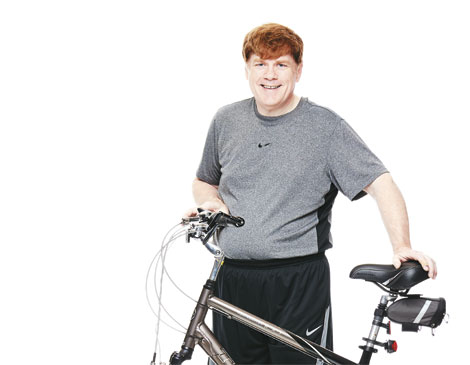Peter Tuttle had experienced chest pains before. The 55-year-old retired Cleveland Heights-University Heights elementary school teacher dismissed those situations as consequences of morbid obesity and physical inactivity. A lifetime of bad eating habits had packed 280 pounds on his 5-foot-10 frame and put him on eight medications to control high cholesterol, high triglycerides, high blood pressure, Type 2 diabetes and gout.
His weight problems were rooted in a "heavy fat, major carb kind of diet" during childhood. Any efforts Tuttle had made in the past to control his weight — he lost 100 pounds at one point — were obliterated whenever he returned to his habit of large meals.
So Tuttle didn't think to call 911 when a sensation he compares to "a real kick to the chest" interrupted an attempt to shovel his driveway after a March 9, 2014, snowfall. He only casually mentioned it during a routine physical the following day. Tests revealed he'd suffered a heart attack — the result of an 85 percent blockage in his left anterior descending artery.
Nine days later, under local anesthesia and a sedative, Tuttle watched Cleveland Clinic doctors place a stent in the blocked artery. Only then did he realize the severity of his condition.
"I had whipped up a will real fast and handed that to my brother," he says. "I wasn't sure whether I was going to leave that room alive."
Dr. Leslie Cho, head of preventive cardiology at the Cleveland Clinic, made it clear a stent wasn't a solution. He needed cardiac rehab, a program of nutritional counseling and supervised exercise in a hospital.
"We put [patients] on an exercise stress test," Cho says. "We figure out what their current functional capacity is, and based on their current functional capacity, we design a program that will improve [it]."
Tuttle began rehab sessions three times a week. Nutritionists taught him to eat properly portioned meals of lean meats and fish, low-starch vegetables and low-sugar fruits.
"From the beginning, my weight started to come off," he says.
Tuttle has lost 55 pounds. He'd like to drop another 25. He now only has a trio of medicines to control diabetes, cholesterol and blood pressure along with a baby aspirin. And he is off injection insulin.
The recent retiree once exhausted by an after-work grocery run now rides a recumbent bicycle and walks on a treadmill every day. He describes himself as a human Energizer Bunny. "Now I just go on and on."




